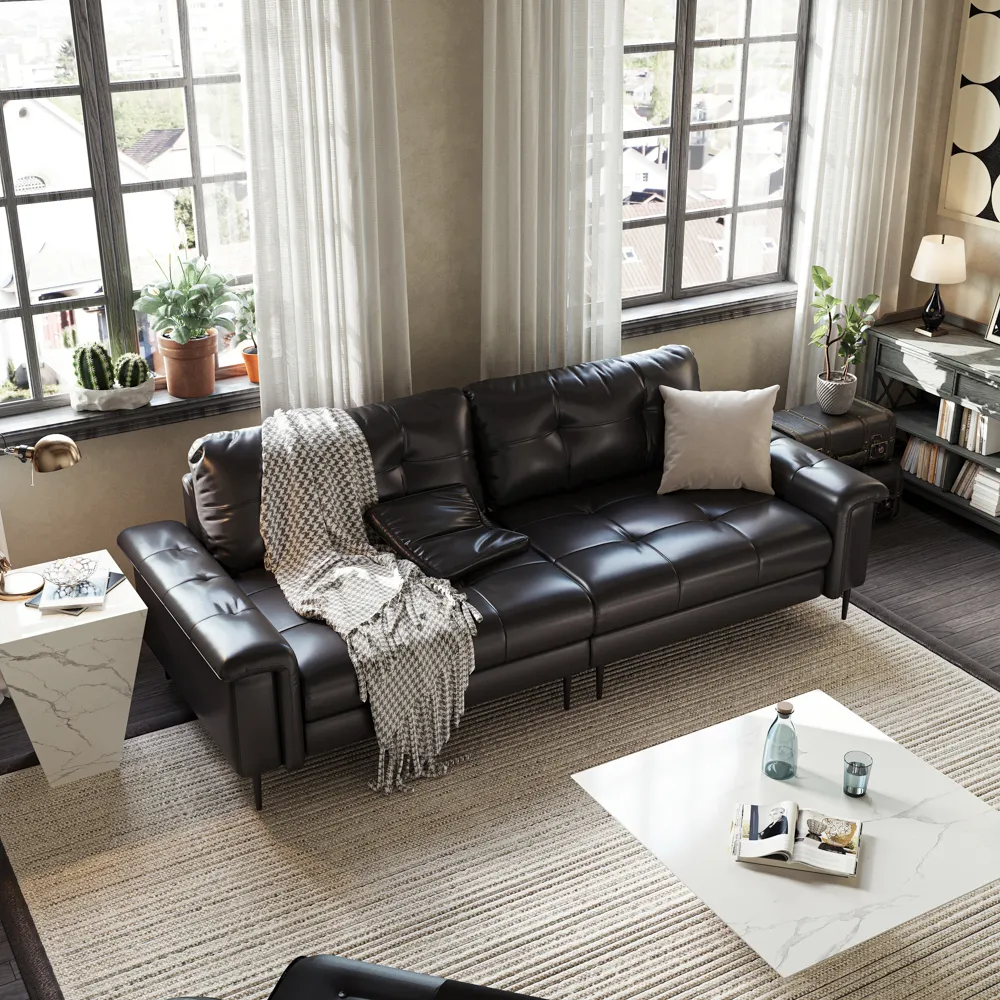While replacing your couch might seem like the only solution, many of these issues are surprisingly fixable with the right tools and techniques.
In this guide, we’ll walk you through how to fix a tear in faux leather sofa surfaces—so you can save money and restore comfort without replacing the whole thing.
Is It Faux Leather?
Before starting repairs, confirm that your sofa is made from faux leather (also called PU leather or synthetic leather). Unlike genuine leather, faux leather has a plastic coating that reacts differently to adhesives, patches, and heat. It’s also more prone to peeling rather than cracking, especially on modular sofas with movable pieces that endure more frequent use.
Common Types of Damage
Understanding the type of damage helps you choose the right repair method:
-
Surface Peeling – Often seen in high-friction zones like seat cushions and armrests
-
Scratches or Small Cuts – Usually caused by pets or buckles
-
Larger Tears – Exposed underlayers or ripped sections needing reinforcement
What You’ll Need for a Faux Leather Repair
Avoid using super glue, duct tape, or sewing methods, which can damage faux leather further. A proper repair kit gives you better results and longer-lasting fixes.
-
Faux leather repair kit (with color-matched compounds)
-
Subpatch fabric (for tears)
-
Palette knife or toothpick
-
Tweezers
-
Rubbing alcohol or vinyl cleaner
-
Blow dryer (optional)
-
Microfiber cloth
Step-by-Step: How to Fix a Tear in Faux Leather Sofa Upholstery
Choosing the Right Repair Method
| Damage Type | Recommended Fix | Notes |
| Surface peeling | Leather filler or coating | Best for aesthetic recovery |
| Small puncture | Heat patch or adhesive kit | Fast, less visible |
| Large tear | Subpatch + filler compound | Stronger, more durable fix |
Step 1: Clean the Area
Wipe the torn or peeling section gently with rubbing alcohol to remove oils, dust, and debris. Let it dry completely before starting repairs.
Step 2: Trim Loose Edges (If Necessary)
Using scissors or tweezers, remove frayed edges. Be careful not to enlarge the tear. Clean again lightly if needed.
Step 3: Insert a Subpatch (For Larger Tears)
Slide a fabric backing (often included in repair kits) behind the tear to stabilize the area. Use tweezers to center it evenly underneath.
Step 4: Apply the Repair Compound
Use a palette knife to spread the filler compound across the tear. Choose a color that matches your faux leather. Apply thin layers, letting each layer dry slightly before adding another.
Step 5: Heat Set (If Kit Requires It)
Some repair kits recommend using a blow dryer on low to help the compound bond and set. Follow your kit instructions carefully.
Step 6: Texture and Finish
Once the surface is dry, gently texture it using the included tool or press cloth. This helps mimic the surrounding leather grain and makes the repair less noticeable.
Optional: Apply a vinyl protectant after the repair cures to improve surface longevity and restore a soft sheen.
Tips to Keep Your Faux Leather Sofa Looking Great
-
Avoid common mistakes: Never sew faux leather—needle holes can worsen the damage. Always color-match the filler carefully, and ensure surfaces are clean before applying any compound.
-
Place the sofa away from direct sunlight to avoid premature drying or cracking
-
Keep pets’ nails trimmed to prevent scratches
-
Use throws or covers in high-traffic areas
-
Clean regularly with a mild solution to avoid buildup
-
Repair early—small tears are easier to fix than large ones
-
Avoid common mistakes: Never sew faux leather—needle holes can worsen the damage. Always color-match the filler carefully, and ensure surfaces are clean before applying any compound.
-
Place the sofa away from direct sunlight to avoid premature drying or cracking
-
Keep pets’ nails trimmed to prevent scratches
-
Use throws or covers in high-traffic areas
-
Clean regularly with a mild solution to avoid buildup
-
Repair early—small tears are easier to fix than large ones
Faux Leather Sofas That Are Stylish and Durable
If your current sofa has seen better days—or you’re looking for a modular sofa that’s easier to maintain long-term—consider upgrading to one designed with durability in mind. Povison offers several faux leather options that are easy to clean and built to withstand everyday use.
For timeless style, the Mid Century Modern Black Leather Sofa is an excellent choice. Its smooth faux leather surface is both resilient and easy to maintain, while the hand-tufted design adds character.

Another great option is the Gray Leather Deep Seat Sofa, featuring soft-touch faux leather and deep seating comfort. It’s a modular design, perfect for modern lifestyles that need flexibility and low-maintenance elegance.

Povison: Designed to Be Ready to Live In
At Povison, we believe that furniture should be functional, beautiful, and built for real life. As a U.S.-based brand with production across China, Vietnam, Malaysia, and Mexico, we offer global quality with accessible value. Each piece arrives fully assembled and is ready to live in—crafted for families who want design without the DIY.
Frequently Asked Questions
Can I use super glue to fix a faux leather tear?
Not recommended. It hardens the surface and often leads to more cracking over time.
How long does a DIY repair last?
With proper prep and mild daily use, a repair can last anywhere from 6 months to a few years, depending on the sofa’s condition and use intensity.
Can I color-match the repair compound at home?
Yes. Most kits include a mixing guide. Test on a scrap surface or hidden area before applying widely.
What if the repaired area still feels rough or visible?
You can lightly sand with ultra-fine sandpaper (if the kit allows) or reapply a thinner final coat for a smoother finish.
Can faux leather be painted to cover larger worn areas?
Yes, but only with flexible vinyl or fabric paint. Regular paint will crack when the surface flexes.
Repair or Replace? Povison Has You Covered
Sometimes, a DIY repair is all it takes. But when you’re ready for a fresh start, Povison makes upgrading easy. Explore our collection of faux leather modular sofas at Povison.com, and discover what it means to live stylishly—and effortlessly—every day.
